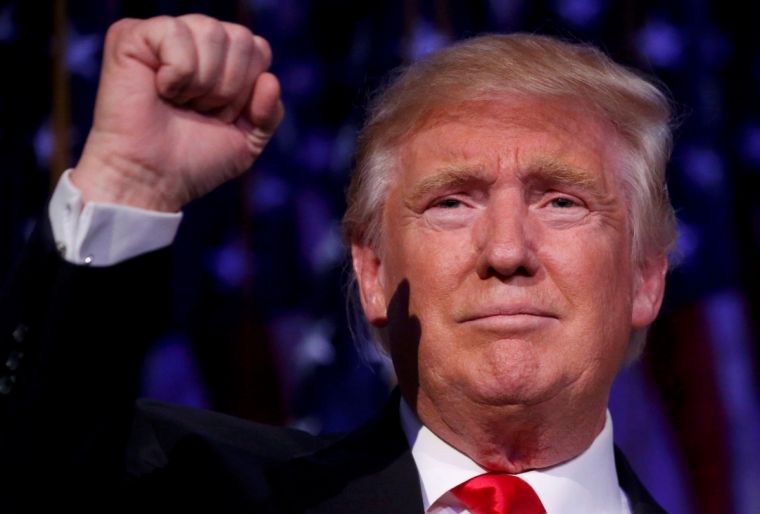Yes, God Is Sovereign. That Doesn't Mean He Chooses Who Runs America

President Trump? Surely some mistake?
No, says the American electorate. Come January, this serial sex pest, braggart, narcissist, bully and all-round loose cannon who has been described as the most unqualified person ever to seek high office will be sworn in.
There is despair among Democrats, alarm among Republicans – Trump ended up running effectively as an independent – panic in the financial markets and profound unease in every world capital except Moscow. The world has suddenly got less safe.
But there are still Christians who are urging us not to worry. And it's not because they are Trump supporters, but because God is sovereign.
Hopefully people have learnt from Brexit - some of the reaction then from Christians seemed to forget the sovereignty of God
— Peter Lynas (@peterlynas) November 9, 2016
Everything that happens, happens because He ordained it. If he is sovereign, that means everything that happens ought to have happened. It is God's will.
I have a prediction. I know exactly what November 9 will bring. Another day of God’s perfect sovereignty.#MaxLucado
— Micky Messer (@MickyMesser) November 9, 2016
CH Spurgeon put it like this: "I believe that every particle of dust that dances in the sunbeam does not move an atom more or less than God wishes – that every particle of spray that dashes against the steamboat has its orbit, as well as the sun in the heavens – that the chaff from the hand of the winnower is steered as the stars in their courses.
I wholeheartedly trust in the sovereignty of God, but I must admit that I am feeling pretty numb this morning #howdidthishappen
— Jenna Ellison (@jellison52) November 9, 2016
"The creeping of an aphid over the rosebud is as much fixed as the march of the devastating pestilence – the fall of sere leaves from a poplar is as fully ordained as the tumbling of an avalanche." And, he might have added, the election of an American president, too. So even for Christians who have argued, begged and pleaded passionately for a contrary result, there is nothing to regret and nothing to worry about. God is sovereign. But is it really true that God dictates the results of elections, by steering voting patterns in key states in exactly the right direction? Does He overrule the free choices of individuals to bring about a particular result? Is that what sovereignty really means?
I'm in the safest place in the whole wide world & it's the Will of God. I don't fear what man can do to me but rest in His sovereignty.
— Nathan F. Wilkes (@nfwilkes) November 9, 2016
That Spurgeonic version of sovereignty has plenty of defenders. Take John Piper, the noted Calvinist teacher and pastor. In a sermon posted online he said: " God has the rightful authority, the freedom, the wisdom, and the power to bring about everything that he intends to happen. And therefore, everything he intends to come about does come about. Which means, God plans and governs all things.
"When he says, 'I will accomplish all my purpose,' he means, 'Nothing happens except what is my purpose.'"

But just pause for a moment on that. Does God purpose evil things, like cancer, or murder? What about genocide? Does God purpose Islamic State? Are we really supposed to believe that it's His divine will that little Yazidi girls are raped, or that Christians are beheaded on a Libyan beach?
What sort of God would we be worshiping if we believed that – and how could we ever call Him good?
This election has been nasty but Christians...you should be resting peacefully in the sovereignty of God whether your "team" won or not!
— Hannah Collins (@h_mcollins) November 9, 2016
The trouble is that the view of God's sovereignty that claims He controls everything relies on a reading of Scripture that is fundamentally mistaken. It takes verses out of context. It misunderstands the use of language in different types of biblical literature. It generalises from particular verses. It assumes that because the Bible is clear about God's purposes regarding Israel, God must have plans for everyone and everything. It leaps from the belief that because God can intervene and shape the destiny of nations and individuals, he invariably does. It's this belief in a particular form of divine providence that has driven the idea of American exceptionalism – that the US is a nation particularly favoured by God – and drove the British Empire in its day as well.
Believing in God's sovereignty doesn't mean he controls everything. That leaves believers with moral problems that are impossible to resolve with any degree of credibility. No matter what subtle word-play is used to avoid the charge, it makes God the author of evil.
The truth is both more and less comforting than that.
It's more comforting because it means our wills are genuinely free. God has not overridden our choices at the ballot box. He has not decided who will win the US election, or which way the Brexit vote would go. He does not decide who will get cancer or which race will suffer genocide. We don't have to engage in complicated verbal gymnastics to try to resolve the hoary old question of free will versus predestination. Leave aside the philosophical conundrum of how to understand God's foreknowledge and whether it necessarily fixes our activity. We have freedom to choose.
It's less comforting because it means our wills are genuinely free. God's sovereignty cannot be used as a comfort blanket, something to wrap around us in the darkness of this election result with the assurance that everything will be alright in the end. In the very end, it will be, because Christians look for an eternal home in heaven. But God's sovereignty does not guarantee that in this world He will preserve us from devastating climate change, from nuclear war, from poverty, from violence in the streets. People do that, not God.
We have absolutely no grounds for saying that He decided who would win this election. He gave the American people the freedom to choose their future, and it was a real choice. Many of them are looking forward with hope; many others with fear. They, and the world, will have to stand the consequences of their choice. Christians cannot assume that God's sovereignty is a safety-net for their own errors; it doesn't work like that.
And the fact that it was a real, human choice means that the election isn't the last word. One of the problems with this mis-application of the doctrine of God's sovereignty is that it can be used to shut down reactions to it. Because it must have been God's will, it's wrong to grieve or lament, or feel shame at what America has done. It's faithless if not actually rebellious: God is sovereign, and all we can do is submit to his will. It's reminiscent of what was said to Remain voters after the European Union referendum in the UK: "You lost the vote, so kindly be quiet." But it wasn't the argument that was lost, it was the vote – and right and wrong aren't decided by a majority.
This has implications for Christians in the US. It can't be assumed that because Trump won the election, he must have won the arguments and that Christians have nothing more to say. On the contrary, Christians are called to think deeply and pray passionately about what God might be saying to them through what has happened. And in some areas they will be called to resist the Trump agenda, with its hatefully divisive rhetoric and policies that split communities and harm the poor. In other areas they may not. Because what has driven his victory is a widespread perception – far more widespread than anyone realised – that for large numbers of people, the brave new world of globalisition and international free trade just hasn't worked. Too much money and power has been concentrated in the hands of too few people. The rich are very rich and the poor are increasingly poor. The system has worked for the few, not for the many, and the many have risen up to take their revenge at the ballot box.
The idea of the billionaire property developer Donald J Trump as a standard-bearer for income levelling is laughable. But US Christians need to hear the strength of their belief and their sense of outrage that things are as they are. And surely, justice, equality and decency are causes any Christian can work with. In his sovereignty, God allows us freedom to do the right thing.
Mark Woods is the author of Does the Bible really say that? Challenging our assumptions in the light of Scripture (Lion, £8.99). Follow him on Twitter:@RevMarkWoods











